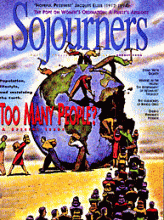My dog is a practitioner of nonviolent resistance. I know you don’t believe this, so I will explain. Last Thanksgiving, at the age of six weeks, she came to live with me on the 13-acre farm in the North Carolina mountains where I rent a small garage apartment.
I knew from Day Two that Savannah was more than just a blonde pup with long eyelashes and a perpetual smile. On her first venture down the porch steps, she fell on her nose and rolled. On her second day, she backed up, took a running start, and spread all four paws out as she lept off the top step—as if to convince herself that if she couldn’t walk down, she would fly. With great aplomb, she picked herself up and trotted on. That was the moment my love for her was sealed.
She has been a source of endless delight, gracing me with an abundance of gifts—companionship, affection, chunks of horse manure, dead snakes. With great pride she set at my feet one day a large, decomposing catfish head, the odor of which reached the far hollows of the county (emanating as it was from her fur, since she had joyfully rolled in it before sharing it with me).
But, sadly, despite her talents, Savannah quickly learned that she was not Miss Popularity on the farm. The horses stomped at her; the geese hissed at her; and the goats menacingly lowered their horns whenever she came near. The grumpy old cocker spaniel who lives in the farmhouse next door growled at her whenever she licked his face (which was several times a day); still, she lavished her unconditional love on him, unable to accept that anyone or anything could find her anything but absolutely lovable.
Read the Full Article
